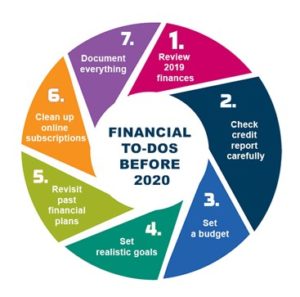American Consumer Credit Counseling discusses seven financial to-dos consumers should achieve before 2020
Boston, MA – November 22, 2019

“Consumers should take the time to review what they spent during 2019,” said Steve Trumble, President and CEO of American Consumer Credit Counseling. “Determine how much was spent on needs and how much was spent on wants to see where you can cut back for 2020 to save more.”
A study by The Ascent found that although 48 percent of consumers want to be financially prepared, 97 percent don’t make time to achieve that. The study also found that only three percent of consumers spend time on their finances daily.
ACCC highlights what to achieve before 2020.
- Review 2019 finances – Reviewing the past year’s finances is very helpful in moving forward to plan for the new year. Consumers should look at their initial goals and see how they align with where they are now. It is also important to note any changes in financial factors, such as a change in income or expenses, and to look at areas that could be improved.
- Check credit report carefully – It is important for consumers to check their credit report as the year comes to an end. While reading through their credit report, consumers should verify that all the information is accurate. If there is any incorrect information, consumers should address it immediately.
- Set a budget – Consumers should plan how much they can, and are willing to spend on daily and monthly expenses. Limiting expenses on things such as groceries or gas will help consumers pave their way to achieving their financial goals.
- Set realistic goals – It is important to set realistic short-term and long-term goals. Setting realistic goals will help consumers keep their finances organized. It may be useful to open different accounts for different uses. For example, if a consumer’s goals are to build up an emergency fund and save for a down payment on a house, the money for each of those goals should be kept in separate savings accounts.
- Revisit past financial plans – Even if a plan worked in the past, it is important that consumers review it to ensure that it still makes sense now. Consumers may have different financial goals or expenses than they did in the past, so it is important to make changes accordingly.
- Clean up online subscriptions – Consumers may benefit from checking account statements to make sure that there aren’t any unused memberships or subscriptions that they are still charged for. Cleaning up unused subscriptions could make a difference in monthly or weekly spending.
- Document everything – Tracking spending, goal progress and other daily financial behaviors can be helpful for consumers to stay on track with their goals and budgets. It can be done in a spreadsheet or a journal.
ACCC is a 501(c)3 organization that provides free credit counseling, bankruptcy counseling, and housing counseling to consumers nationwide in need of financial literacy education and money management. For more information, contact ACCC:
- For credit counseling and student loan counseling, call 800-769-3571
- For bankruptcy counseling, call 866-826-6924
- For housing counseling, call 866-826-7180
- Or visit us online at http://www.ConsumerCredit.com
About American Consumer Credit Counseling
American Consumer Credit Counseling (ACCC) is a nonprofit credit counseling 501(c)(3) organization dedicated to empowering consumers to achieve financial management through credit counseling, debt management, bankruptcy counseling, housing counseling, student loan counseling and financial education concerning debt solutions. To help consumers reach their goal of debt relief, ACCC provides a range of free consumer personal finance resources on a variety of topics including budgeting, credit and debt management, student loan assistance, youth and money, homeownership, identity theft, senior living, and retirement. Consumers can use ACCC’s worksheets, videos, calculators, and blog articles to make the best possible decisions regarding their financial future. ACCC holds an A+ rating with the Better Business Bureau and is a member of the National Foundation for Credit Counseling® (NFCC®). For more information or to access free financial education resources, log on to ConsumerCredit.com or visit https://www.consumercredit.com/debt-resources-tools/

